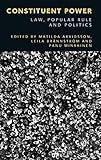Constituent Power : Law, Popular Rule and Politics / Matilda Arvidsson, Leila Brännström, Panu Minkkinen.
Material type: TextPublisher: Edinburgh : Edinburgh University Press, [2022]Copyright date: ©2020Description: 1 online resource (232 p.)Content type:
TextPublisher: Edinburgh : Edinburgh University Press, [2022]Copyright date: ©2020Description: 1 online resource (232 p.)Content type: - 9781474454971
- 9781474454995
- 321.8 23
- online - DeGruyter
| Item type | Current library | Call number | URL | Status | Notes | Barcode | |
|---|---|---|---|---|---|---|---|
 eBook
eBook
|
Biblioteca "Angelicum" Pont. Univ. S.Tommaso d'Aquino Nuvola online | online - DeGruyter (Browse shelf(Opens below)) | Online access | Not for loan (Accesso limitato) | Accesso per gli utenti autorizzati / Access for authorized users | (dgr)9781474454995 |
Frontmatter -- Contents -- Editors’ Introduction -- Politics, Shamelessness and the People of Ressentiment -- Part 1 The Ambiguities of Constituent Power -- 1 ‘Enemies of the People’? Th e Judiciary and Claude Lefort’s ‘Savage Democracy’ -- 2 Public Space, Public Time: Constitution and the Relay of Authority in Arendt’s On Revolution -- 3 Are Th ere Inherent Limits to Constitutional Amendment? An Analysis of Carl Schmitt’s Argument -- Part 2 Popular Identity and its Others -- 4 Th e People: Ethnoracial Configurations, Old and New -- 5 Hannah Arendt and the Glimmering Paradox of Constituent Power -- 6 Constituent Power from Cultural Practice: Implications from the Malheur Wildlife Refuge Occupation -- 7 Claiming Human Rights: The Reflexive Identity of the People -- Part 3 Democracy and Populism -- 8 Katechontic Democracy? Carl Schmitt and the Restraining Mediation of Popular Power -- 9 Th e Power of the People -- 10 Populism: Plebeian Power against Oligarchy -- 11 Constituent Power and Constitutive Exceptions: Carl Schmitt, Populism and the Consummation of Secularisation -- Index
restricted access online access with authorization star
http://purl.org/coar/access_right/c_16ec
Analyses the political and legal power of ‘the people’ in contemporary democratic societiesPresents interdisciplinary perspectives from legal theory, political theory, and the history of ideasBrings together an international range of contributors from Europe, North America and Latin AmericaProvides in-depth analyses of contemporary problems that afflict constitutional democracies globallyIncludes a lead essay by Benjamin Arditi, a leading global expert on populism and popular sovereigntyRecent social and political developments, including the presidential elections in the United States, antidemocratic state policies in Hungary and Poland, and the political climate in the rest of Europe have brought questions relating to the position and composition of ’the people’ in constitutional democracies to the forefront. This book confronts these questions head on as leading scholars across the fields of law, legal theory, political theory and history explore the contemporary problems facing constitutional democracies.With a strong focus on constitutional law, this book examines the legal as well as the political power of ‘the people’ in constitutional democracies. Bringing together an international range of contributors from the USA, Latin America, the UK and continental Europe, it explores the complex relationship between constitutional democracy and ‘the people’. Contributors explore this relationship through the lens of radical democracy, engaging with the work of key figures such as Hannah Arendt, Carl Schmitt, Claude Lefort and Jacques Rancière.
Mode of access: Internet via World Wide Web.
In English.
Description based on online resource; title from PDF title page (publisher's Web site, viewed 27. Jan 2023)


